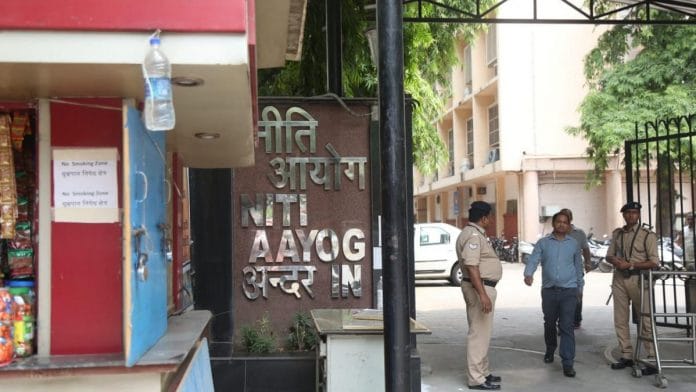New Delhi: The Niti Aayog has set up a high-level panel for better coordination and integration of the Narendra Modi government’s initiatives in the sphere of India’s blue economy.
Blue economy broadly refers to the use of ocean resources for economic growth, improved livelihoods and jobs in a sustainable manner. This includes different sectors such as fisheries, tourism, offshore oil and gas and infrastructure among others. India’s blue economy is estimated to be around four per cent of the Gross Domestic Product (GDP).
The new Blue Economy Coordination Committee (BECC) will be headed by the Niti Aayog vice chairman Rajiv Kumar and will have as members, the organisation’s CEO, Amitabh Kant; deputy National Security Adviser, former Navy chief Admiral R.K. Dhowan (retd); as well as secretaries of the ministries of external affairs, defence, home affairs, commerce, fisheries, earth sciences and department of expenditure among others.
According to an order issued by Niti Aayog, a copy of which has been accessed by ThePrint, the committee will ensure effective coordination among stakeholder central ministries, states and union territories and other agencies on various critical programmes and initiatives undertaken in the blue economy domain.
The committee will also ensure integration of national and state plans, policies, programmes in the six functional clusters, which have been formed to look at various aspects of the blue economy.
These six functional clusters include a National Accounting Framework, which will be overseen by the Ministry of Statistics and Programme Implementation; Marine Fisheries under the Department of Fisheries; Logistics, Infrastructure and Shipping under the Ministry of Ports, Shipping and Waterways; Coastal and Deep Sea Mining, New and Renewable Offshore Energy and R&D under the Ministry of Earth Science; National Coastal Marine Spatial Planning Framework under the Ministry of Environment, Forest and Climate Change and Security and International Engagement under the National Security Council Secretariat.
The Niti Aayog’s panel will also “harmonise” national actions with international best practices and obligations under various treaties in respective maritime domains, the order states.
A senior government official told ThePrint that the formation of the BECC is a step in the right direction. “It still needs to be seen whether this panel can perform better than other multi-sectoral and multi-ministerial committees without wrapping itself in red tape,” the official said.
The official added that the new committee is similar to those constituted in the past, albeit with differences in their mandate and charter.
“All the committees need to formulate a common strategy to achieve a high economic growth with collaborative cooperation and security,” the official said.
Also read: Success stories, ‘Covid seva’ top Modi govt, BJP plans for 2nd anniversary of 2nd term
Why this panel?
According to the Niti Aayog, the vision for enhancing India’s maritime potential and role in the maritime domain has been put out in the form of different initiatives by the government.
The Aayog order says the variety of activities and interests in the maritime sector and the lack of an integrated and coordinated approach towards them lead to overlaps and duplication, thus giving way to inefficiencies, suboptimal performances of schemes and utilisation of resources.
“There are also jurisdiction issues between states and the Centre on maritime matters. In the absence of an appropriate mechanism, the coordination and integration of the national maritime assets, resources and efforts may not be optimal,” the Niti Aayog order states.
The order highlights that the need for sustained economic growth in India is determined by a range of economic activities linked to the maritime domain to a large extent.
With India aiming to become a high-growth economy and looking to enhance its capabilities in the maritime domain, a critical factor will be its ability to play a consequential maritime role.
“This ability will not just be a product of strong maritime power, but also of a robust maritime economy that is sustained by ports, coastal infrastructure, shipping, fishing, seaborne trade, offshore energy assets, undersea pipelines and cables and seabed resources,” the order states.
The blue economy
A second senior government official said blue economy is a nouveau term for business conducted in the oceans, the global commons, for centuries.
“India is looking to leverage the blue economy to a $10 trillion estimate in the next decade and it will power the growth cycle of India like never before,” the official said.
The first official quoted above said the vast coastline of India and its predominant maritime geography places all blue economy initiatives as the best platform for engaging the Indian Ocean Region littorals for cumulative growth.
In 2019, the Modi government in its vision for New India by 2030 highlighted the blue economy as one of the 10 core dimensions of economic growth.
In 2018, Niti Aayog had set up a committee under former Navy chief Admiral R.K. Dhowan (retd) and senior IAS officer Viswapati Trivedi to draft a National Maritime Policy. The draft policy was sent for inter-ministerial consultations in 2019.
The Economic Advisory Council to the PM also came up with a draft policy framework document in September, 2020.
Both these draft policy documents had highlighted the lack of a single national agency for coordination and integration of maritime activities which comes under various sectors, such as ocean and coastal economy, energy, infrastructure, environment, shipping, law, culture, tourism among others.
Since they are dealt with by different ministries and agencies, the reports had called for a cohesive maritime governance network for better coordination among different stakeholders.
The second official quoted above said India has been a maritime and seafaring nation from about 5,000 years ago, but in the last 400-odd years, there has been a decline in the maritime consciousness in the mindset of the nation.
“But, with a renewed vigour and an effort to find its place in the global stage, India is once again looking to the oceans,” he said.
Also read: 4-hr playtime, identifying 3 crore out-of-school kids — Niti Aayog lays roadmap for education







What a discovery!!!